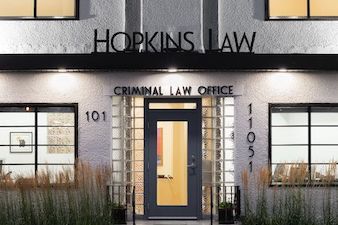Young Offenders
Hopkins Law specializes in criminal defence. We are based in Edmonton and practice throughout Alberta. Our experienced lawyers represent clients charged with serious offences at all levels of court. If you are looking for pragmatic, honest, no-nonsense advice, turn to Hopkins Law.
Young Offender Lawyers – Edmonton & surrounding area
587-414-6851 *available 24/7
Hopkins Law – Criminal Lawyers
Edmonton: 11051 97 Street #101


If you are a young person who is charged with a crime, the justice system can be daunting. It may be the first time you have ever dealt with police, lawyers or judges. If you have a prior youth record, you may be facing the prospect of custody for the first time. You need the help of an experienced lawyer who can guide you through the process.
You have been charged as a young offender—what do you need to know?
The Youth Criminal Justice Act is the law that governs youth who are charged with crimes. The act applies to people who are between the age of 12 and 17—in Canada, you cannot be charged with a crime if you are under 12 years of age. If a young person is convicted of a serious violent crime, the Crown can apply for an adult sentence. The Crown would have to convince the court of two things: first, that the young person does not have reduced moral culpability, and second, that a youth sentence would not be sufficient to hold the young person accountable.
There are a number of critical differences between the Youth Criminal Justice Act and the Criminal Code. The law recognizes that young people are not as mature as adults. The youth system takes the reduced moral culpability of young people into consideration. Rehabilitation is only one factor in adult sentencing, but it is the most important principle for youths.
There are three primary goals of the youth justice system. First, the system is intended to hold young people accountable, in a way that is proportionate to their reduced responsibility. Second, the goal is to promote rehabilitation and reintegration of young people into society. Third, crime prevention is supported through referrals to community programs and agencies that try to address the underlying reasons for criminal behavior.
There are broad provisions for “extrajudicial measures” when dealing with young people. Extrajudicial measures can take the form of a warning, a police caution, or a referral to a community program. The most formal extrajudicial measures are called “extrajudicial sanctions.” If a young person qualifies for extrajudicial sanctions, and complies with any conditions that are imposed, his or her criminal charges will be dropped.
The bail provisions under the Youth Criminal Justice Act are completely different from the adult system. The court has discretion to detain a youth before trial, but only when certain criteria are met. First, the young person has to be charged with a serious crime, or have a history of outstanding charges or prior convictions. Next, one of the following three grounds has to exist: 1) it is substantially likely that the young person will not appear in court if they are released, 2) detention is necessary to protect the public, or 3) there are exceptional circumstances that justify detention in order to maintain public confidence in the justice system. Finally, the court needs to consider the possible conditions that a youth could be released on, and will only detain the youth if no conditions can address the court’s concerns.
There are also a number of youth sentencing options that are not available to adults. For example, a minor youth offence might be dealt with by a reprimand from the court—basically a stern lecture from the judge. Other options include intensive support orders, program attendance orders, deferred custody and supervision orders, and intensive rehabilitative custody. When sentencing young people, jail is seen as a last resort—but it is still possible to receive a custodial sentence.
Common Questions
If I am convicted of a crime as a youth, will I have a criminal record?
This question is more complicated than you might guess. The short answer is that all youth records are sealed or destroyed after a certain period of time—but only if there are no subsequent adult convictions during that period. Depending on the type of crime, there is a ‘period of access’ to the youth record. This period is anywhere from two months to five years after the sentence is completed. If the young person becomes an adult, and is convicted of a crime during the access period, then the youth record will become a part of the adult criminal record.
Can I go to jail if I am convicted as a youth?
Yes, but a judge needs to consider all other available options before imposing a custodial sentence. Custodial sentences for youths are usually limited to serious violent offences or to serious repeat offenders. When sentencing a youth to jail, there is usually a combination of “closed” and “open” custody. Closed custody usually takes place outside of the community in a secure, supervised building. Open custody usually takes place at a smaller residence inside the community, where youth are supervised and must remain with staff unless they have permission to leave.
Hopkins Law recognizes that even though the stakes are less serious for young offenders, dealing with the court process can be much more challenging. It is important to remember that Legal Aid will cover the costs of a lawyer for any young person. You can specifically request a lawyer from Hopkins Law as your counsel. If your matter is serious, and you do not want to wait for a lawyer to be appointed, Hopkins Law will treat you fairly when negotiating a retainer. If you are charged with a crime, you need a competent lawyer at your side. Hopkins & Company is your defence.
Young Offender Lawyers – Edmonton & surrounding area
587-414-6851 *available 24/7
Hopkins Law – Criminal Lawyers
Edmonton: 11051 97 Street #101

Author:
